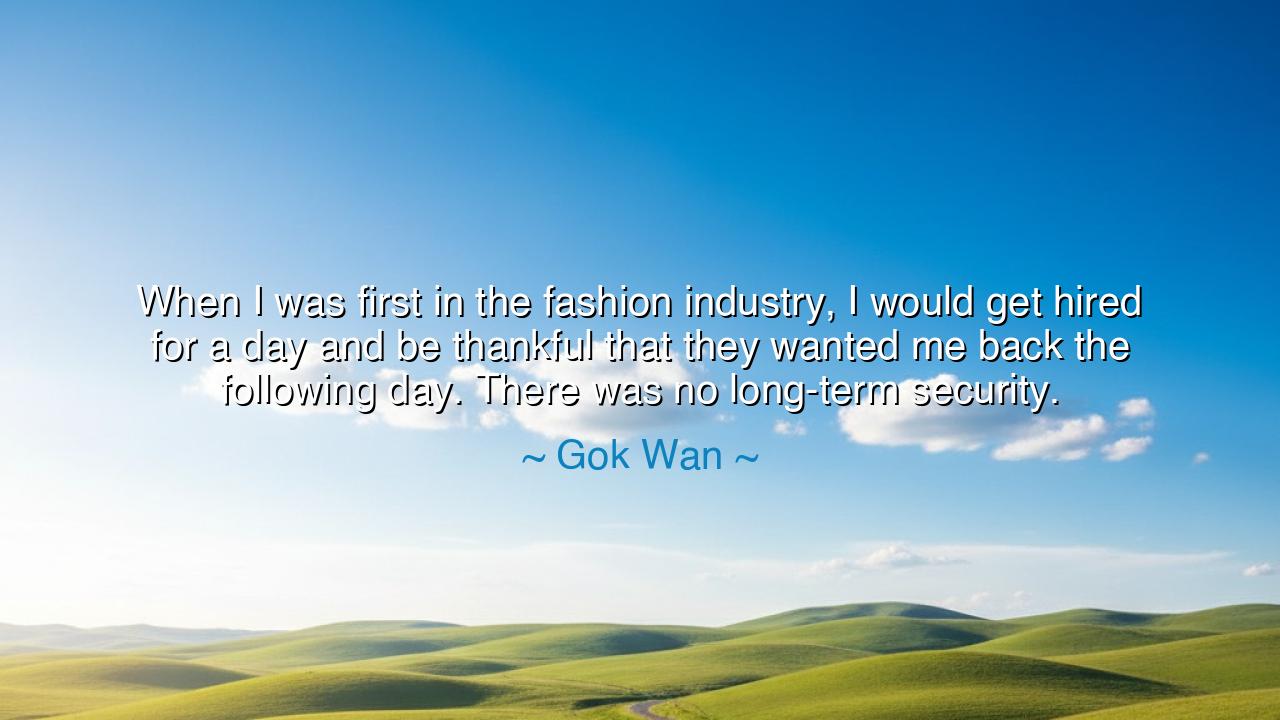
When I was first in the fashion industry, I would get hired for
When I was first in the fashion industry, I would get hired for a day and be thankful that they wanted me back the following day. There was no long-term security.






Gok Wan once reflected on the beginnings of his journey with honesty and humility: “When I was first in the fashion industry, I would get hired for a day and be thankful that they wanted me back the following day. There was no long-term security.” These words speak not only of one man’s struggle but of the universal truth of beginnings—the fragile stage of any calling where hope must be carried more by endurance than certainty, and where gratitude for small victories becomes the fuel for survival.
The ancients knew this season of life well. Every great hero, philosopher, or craftsman began with uncertainty. The blacksmith’s apprentice swept floors before he held the hammer. The poet sang to empty rooms before his words reached the courts of kings. Even Odysseus, wise and cunning, wandered for years without security, surviving only by faith and resourcefulness. Gok Wan’s thankfulness for each day’s return to work mirrors this timeless struggle: greatness is often born in the crucible of instability, where each step forward is earned anew.
The heart of his statement lies in the tension between fragility and gratitude. To live without long-term security is to carry constant fear, yet Wan chose to focus not on despair but on being thankful for every renewed opportunity. This reveals a deep truth: the spirit that survives uncertainty is not the one that clings to guarantees, but the one that can celebrate the smallest footholds. Gratitude transforms instability from a curse into a teacher, shaping resilience, humility, and endurance.
History provides powerful examples of this. Consider Vincent van Gogh, who lived much of his life in poverty, often unsure where his next meal would come from. There was no security in his work; yet he painted, day after day, thankful for every chance to express what burned within him. Though he did not live to see his genius recognized, his perseverance turned his fragile beginnings into a legacy that reshaped art forever. Wan’s words echo this same spirit: sometimes survival in the present, coupled with gratitude, builds the foundation for future greatness.
There is also a lesson here about the illusions of permanence. Even in modern times, we crave contracts, assurances, guarantees. But life, in its essence, offers no true security. Empires fall, fortunes crumble, fame fades. The wise learn, as Wan did, to build their strength not on promises of tomorrow but on faithfulness today. To be thankful for the day’s work, for the chance to return again, is to live fully in the present and to recognize that greatness grows from perseverance in uncertainty.
The deeper meaning, then, is that gratitude and resilience are stronger than guarantees. Wan’s humility in his early days prepared him to endure, to grow, and eventually to lead in the very industry that once gave him work one day at a time. His testimony is a reminder that uncertainty is not the enemy of destiny—it is the soil from which destiny grows.
The lesson is clear. To the young, do not despise humble beginnings or fear the absence of security. Be thankful for every opportunity, no matter how small or fleeting, and build upon it with diligence. To the weary, remember that each day survived, each chance repeated, is evidence of unseen progress. And to the successful, never forget the fragility of your start—carry gratitude always, for it is gratitude that sanctifies success.
Practical counsel may be given. Keep a spirit of thankfulness for every opportunity, however brief. Focus on what can be done today rather than being paralyzed by fears of tomorrow. Persevere in your craft even when recognition is scarce, for mastery is forged in seasons of uncertainty. In this way, like Gok Wan, you may one day look back on your beginnings with reverence, seeing that the days without security were not wasted, but were the very crucible that prepared you for greatness.






AAdministratorAdministrator
Welcome, honored guests. Please leave a comment, we will respond soon